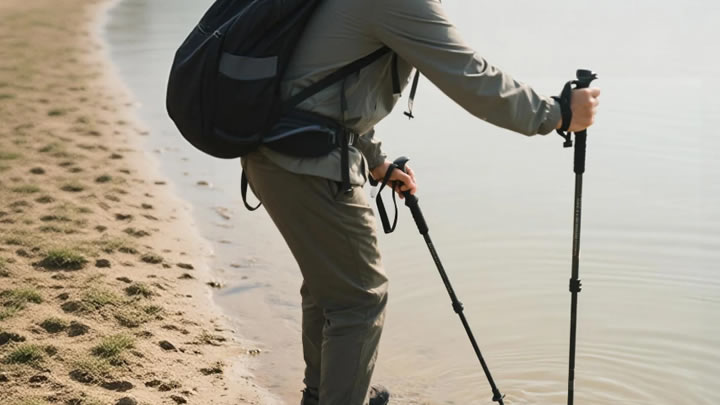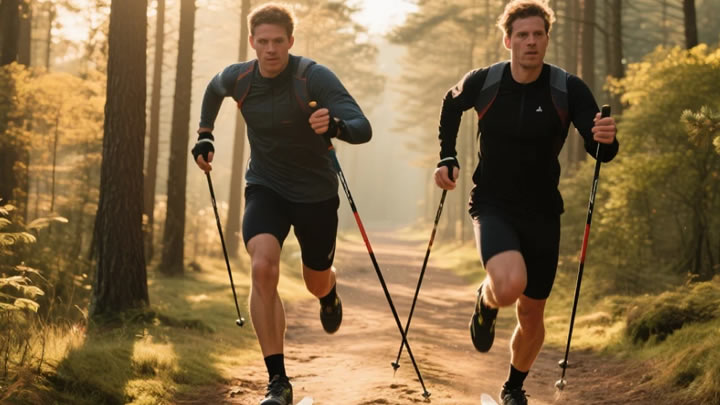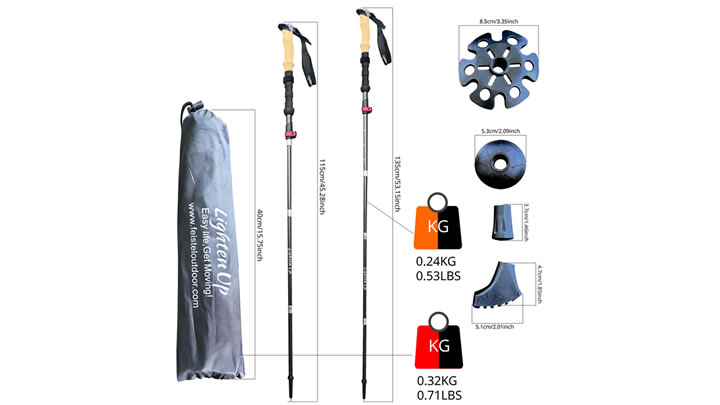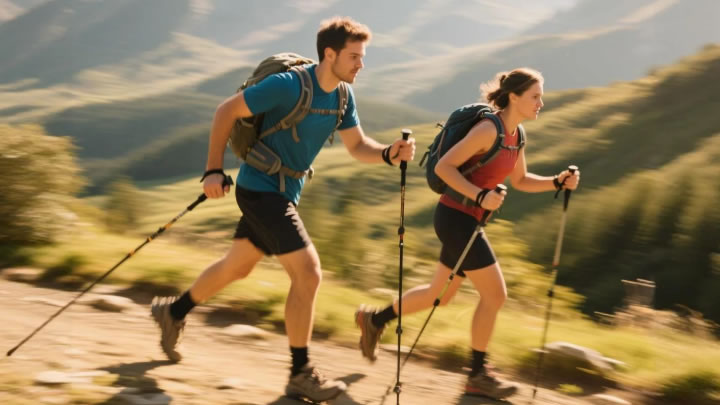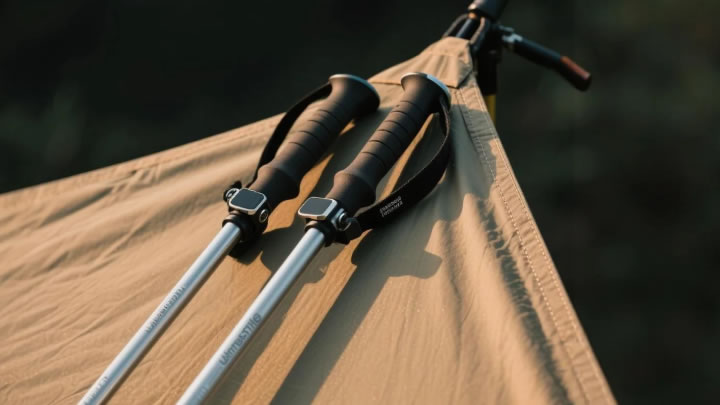Ultralight gear for desert vs mountain hiking
Ultralight hiking thrives on minimalism, but desert and mountain environments demand wildly different strategies. From scorching sands to freezing alpine slopes, your gear must adapt to survive. Here’s how to optimize your ultralight kit for these extremes—without sacrificing safety or comfort.
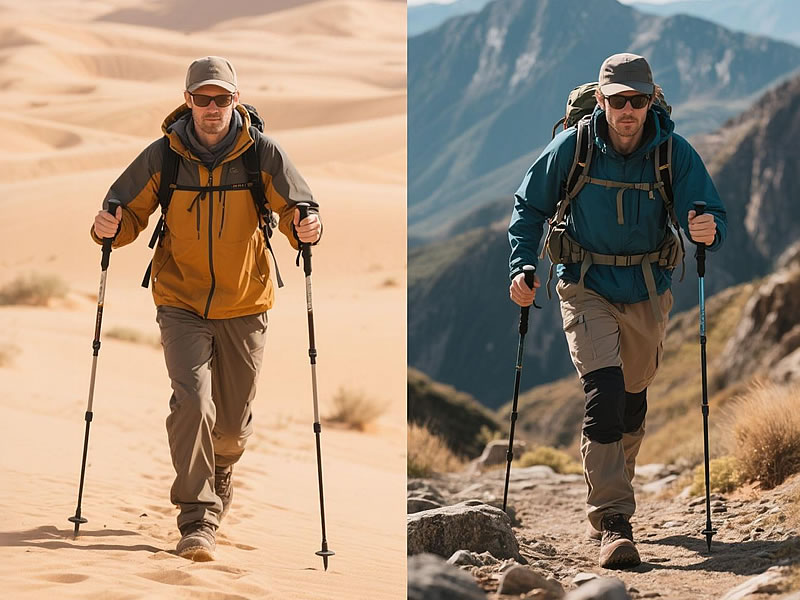
Desert Hiking: Beat the Heat and Thirst
Deserts challenge hikers with relentless sun, sand, and scarce water. Ultralight gear here prioritizes shade, hydration, and sun protection.
Shelter: Lightweight Shade Systems
- Zpacks Hexamid Pocket Tarp (10 oz/283g): A minimalist shelter with mesh walls for airflow and UV protection. Pair with a SOL Emergency Blanket (3.5 oz) as a reflective groundsheet.
- Sun Hoodie + Umbrella Combo: The Montbell Cool Hoodie (UPF 50+, 5 oz) and Six Moons Silver Shadow Umbrella (8 oz) block sun while hiking.
Hydration: Maximize Water Security
- CNOC Vecto 4L Bladder (3 oz): Collapsible and sand-resistant. Pair with a Sawyer Squeeze (3 oz) to filter murky desert springs.
- Electrolytes: Nuun Sport Tablets (0.1 oz each) combat rapid dehydration (desert sweat rates can exceed 2L/hour).
Clothing: UV Defense and Ventilation
- Patagonia Capilene Cool Daily Hoody (UPF 50+, 4.5 oz): Wicks sweat and blocks 98% UV rays.
- OR Echo Sun Gloves (1 oz): Protect hands without overheating.
Pro Tip: Hike at dawn/dusk and cache water if possible.
Mountain Hiking: Conquer Cold and Storms
Alpine environments demand gear that handles wind, rain, and rapid temperature drops. Focus on insulation, weatherproofing, and traction.
Shelter: Stormworthy and Light
- Durston X-Mid 1P (28 oz/794g): Double-wall design with snow-load-ready geometry.
- Sleep System: Western Mountaineering UltraLite sleeping bag (20°F/-6°C, 21 oz) + Therm-a-Rest NeoAir XTherm (R-value 6.9, 15 oz).
Layering: Ultralight Warmth
- Base Layer: Icebreaker Merino 150 (5 oz) for odor-free insulation.
- Mid Layer: Montbell Plasma 1000 Down Jacket (6 oz, 900-fill power).
- Shell: Outdoor Research Helium Rain Jacket (6.4 oz) + Zpacks Vertice Pants (4 oz).
Traction and Safety
- Kahtoola Microspikes (11 oz): Essential for icy trails.
- Garmin inReach Mini 2 (3.5 oz): SOS and weather updates in exposed terrain.
Pro Tip: Pack a Nitecore NU25 UL Headlamp (1 oz) for early alpine starts.
Desert vs Mountain: Gear Comparison
| Category | Desert Essentials | Mountain Must-Haves |
|---|---|---|
| Shelter | Hexamid Tarp + Reflective Blanket | Durston X-Mid 1P |
| Water System | 4L Bladder + Sawyer Squeeze | 2L Smartwater Bottles + Filter |
| Footwear | Sandals (Bedrock Cairns) + Gaiters | Trail Runners (Altra Lone Peak) |
| Clothing | UPF 50+ Hoodie + Sun Umbrella | Merino Base + Down Jacket |
| Emergency Gear | Extra Electrolytes + Signal Mirror | Microspikes + Bivvy Sack |
Shared Ultralight Essentials
- Navigation: Gaia GPS app (offline maps) + Suunto Clipper compass (0.3 oz).
- Calorie-Dense Food: 120+ cal/oz snacks like ProBar Meal Bars or DIY nut mixes.
- First Aid: Ultralight kit with leukotape, ibuprofen, and tweezers (2 oz).
Environment-Specific Risks
- Desert:Heatstroke: Body temps can hit 104°F (40°C) in 2 hours without shade.Sand Damage: Grit destroys zippers—use Lubricant Wipes (0.2 oz).
- Mountains:Hypothermia: Wet + wind chill = lethal combo. Always pack a waterproof layer.Altitude Sickness: Carry Diamox (prescription) for elevations above 10,000 ft.
Budget-Friendly Swaps
- Desert: DIY shade tarp (20 Tyvek sheet) +20Tyveksheet)+5 bandana soaked in water for cooling.
- Mountains: Decathlon Trek 100 down jacket (80, 10 oz) + Frogg Toggs rain pants (80,10oz)+FroggToggsrainpants(20, 4 oz).
Pro Tips for Multi-Environment Trips
- Modular Systems: Use a Zpacks Arc Blast pack (16 oz) with removable hip belt for desert-to-mountain transitions.
- Adaptable Layers: Convertible pants (Prana Zion Stretch) work in both climates.
- Skill Over Gear: Learn to read weather patterns and navigate without tech.
Conclusion: Master the Extremes, Minimize the Load
Ultralight desert and mountain hiking share a core philosophy: carry only what you need, but never compromise on critical protection. By tailoring gear to environmental threats—whether solar radiation or blizzards—you’ll hike smarter, safer, and lighter. Remember: The right gear won’t just lighten your pack—it might save your life.

